There can be spoilers…just for one blog!
Wow.
I just finished watching the sixth and final SHORT TREKS of the second round of mini-episodes (do we call them “seasons”?). The shortest of all of the Short Treks thus far, the episode runs only 6 minutes and 47 seconds before the closing credits roll. But it’s time well-utilized!
It’s hard to know what to say first. In these editorial review blogs, I try not to just parrot what all of the other reviewers are saying because…what’s the point? Most reviewers are offering a summary of the episode. If you want that (and don’t mind the spoilers), then check out this review for a short summary or this review for a much more detailed recounting.
Many reviewers are concentrating on the kick-in-the-gut feel of the attack on Mars, and that was very obvious. This incident is going to be a paradigm shift for the Federation …just as the December 7, 1941 Japanese surprise attack on Pearl Harbor and the terrorist destruction of the World Trade Center on September 11, 2001 were for the United States and the world. Nothing would ever be the same again. After “Children of Mars,” the date that will live in infamy will be April 5—First Contact Day—and the culprits won’t be a foreign Pacific power or Middle Eastern extremists but these mysterious “Synths” (whatever they are).
A few folks are complaining that the starships at Utopia Planitia look more like movie-era or even Discovery-era designs rather than 24th century vessels. And yeah, the VFX guys probably kept things cheap and used the models they had on hand. Others complained that it was never really explained why these two girls initially hated each other (was it all just over a shoulder bump?), although I don’t think that was important for us to know. The impact of the story wasn’t why they were fighting so much as what made them stop.
So no, I’m not going to rehash any of that. Instead I am going to say something totally provocative and controversial:
I think GENE RODDENBERRY would have hated “Children of Mars” being presented as Star Trek.
And even more controversial:
I also think he would have been dead wrong!
Okay, let’s begin…
I only ever met and spoke with Gene Roddenberry once in my life, and that was in a side conference room full of people at a con in 1984 waiting for Gene to go on stage. And while I know and have worked with Gene’s son ROD RODDENBERRY on occasion, I can’t claim to be a “Gene expert.” Therefore, when I say that Gene would have hated “Children of Mars,” I made sure to include “I think” because I obviously can’t be certain.
But I do know that it was widely accepted that Gene saw the world of the 23rd and 24th centuries as a social and economic “utopia” for Earth and the Federation. We had (somehow) conquered challenges like poverty, sickness, hunger, inequality, and yes, prejudice. Most of us have heard the stories about how, during the first few seasons of Next Gen, Gene angered and confounded the writers by not allowing for dramatic frictions between the crew members of the Enterprise-D. In the future, he’d say, everybody gets along with everybody else (except for the “bad guys” like the Romulans and Ferengi) because we’ve matured as a species. We explore space and celebrate science. We’re not bullies.
Ironically, one of Star Trek‘s most famous bullies was not only introduced under Gene’s watch but actually went to Starfleet Academy with Kirk. I refer, of course, to Sean Finnegan, the Irish jokester who made “Jimmy-boy”‘s life as a cadet a living hell. But Finnegan was necessary for the story of the episode “Shore Leave,” and while we all loved to hate Finnegan, he seemed to be having some good-natured fun and laughing (annoying so) while doing it.
In “Children of Mars,” these two lasses hate-hate-HATE each other, and their mutual animosity and wordless vitriol are palpable and visceral. And worse yet, it seemed to come out of nowhere. Maybe Lil (the girl with the freckles) is pissed off at her dad, having a bad day, and takes it out on poor Kima by bumping her hard, knocking her down, and making her miss a shuttle bus to school…or maybe it’s just an accident. Hard to know, but does it really matter? The seeds of hatred have been planted.
Meanwhile, instead of turning the other cheek as Gene would have wanted wanted from a “mature” citizen of the United Federation of Planets, Kima escalates the frictions, Lil retaliates, and before you know it, Iranian generals are getting assassinated and missiles are being fired at military bases in the middle of the night. Oh, wait…that’s a different channel on the TV.
Anyway, I think Gene would be running into the writers room waving his arms and shouting, “No, no, no! That’s not what it’s like in the future! Children wouldn’t be this cruel to each other. In the future, parents wouldn’t abandon their kids for years just to work longer hours building starships! Schools wouldn’t allow this kind of fighting. It almost seems like some kind of racial hatred between humans and aliens, and we don’t have that either! You can’t do this episode.”
But if Gene had nixed “Children of Mars,” that would have been a sad thing indeed because this was a beautifully crafted episode. More on that in a moment. But first, let’s talk about the “darkening” of Star Trek in the years since Gene’s death in 1991.
The first example of Star Trek‘s “evolution” from Gene’s utopian view of the future was the emergence of Deep Space Nine in 1993, which was billed to the public as a “darker” Star Trek. Of course, compared to Discovery, DS9 now feels like a Disney princess movie, but back then, it was a huge departure from everything being bright and colorful and everyone getting along.
Voyager was even darker, initially putting together two crews that were enemies and then navigating home through a quadrant that was more like the galactic equivalent of South Central Los Angeles with gangs and guns and hostile intentions. Forget exploring strange, new worlds—everywhere Voyager went in the Delta Quadrant, someone was trying to use them for target practice!
But it wasn’t until Enterprise reached its post-9/11 third season in 2003 that Star Trek truly took a leap into the darkness. The Xindi attack on Florida and the PTSD reaction of the NX-01 crew was something that I truly believe would have had Gene whirling like a Dervish in his grave. And honestly, that season was hard for me to watch, as well, as Archer’s less kind, less gentle “tough guy” personage was hard to reconcile with what Star Trek had meant to me. Star Trek was always a “safe” place I could go to escape the darkness of the real world…and now it seemed to be just as dark.
Granted, if you think back, Star Trek always did provide a reflection of the ills of the real world, whether it was racism in the 1960s, the war in Vietnam, overpopulation, homophobia in the 1990s, homelessness, or any number of other hot-button issues. But somehow, the stories kept a bit of a distance from it. The characters were affected by the issues during the episode(s) themselves, but they’d get past it all somehow. Even continuing storylines like Nog’s own PTSD during the Dominion War and Bashir’s interactions with the nefarious Sloan from Section 31 were eventually resolved with satisfying endings. I suppose Archer and his crew eventually got past trauma of the Xindi attack, as well, but it took most of the third season for it to happen.
Then everything went out the window with Discovery, as that darkness was built into the very DNA of the first season, and by the second, Starfleet was building Skynet and sowing the seeds of its own demise while Section 31 did whatever the heck Section 31 does these days.
And that brings us back to “Children of Mars.” While I mourn the loss of innocence and “safety” that Star Trek has represented to me for the last five decades, I have to admit and acknowledge that the world itself has changed, television has changed, and maybe Star Trek needs to change, too.
Man, I can’t believe I just said that!
I mean, it’s still an uphill battle for me with Discovery, but it looks like, from what we just saw with “Children of Mars” (which likely takes place about 13-15 years before the time of the upcoming STAR TREK: PICARD) that the new Picard series will be “dark.” Gone are the days of a perfectly-imagined future utopia where everyone loves and respects everyone else (except Finnegan). There is hate in this future world, pain, suffering, loneliness, anger. Yes, it saddens me, but I also know that, without the darkness, the light—and the hope for that light—loses its impact and significance.
Star Trek should ALWAYS have significance. That was true in the 1960’s, and it is true today. But can Star Trek retain its significance in a world like the one that exists in 2020? I realize that many fans of The Orville will say that, yes, you can have a “light” show that is still successful—in many ways even more so than Discovery. I don’t disagree. But I don’t think the secret to the Orville‘s success is its inherent lightness. There are been some VERY dark episodes of that show in the second season. I think the reason many fans prefer The Orville to Discovery (and I realize that there’s also a vice-versa to that statement) is that Orville, in general, has better writers and more engaging stories—not that one is dark and the other is light.
But back to Picard…
There’s one thing we all know in our hearts: this new show can’t be just another TNG. There’s no reason for SIR PATRICK STEWART to simply return to that same well because he’s long since drained it. So this new series WILL be different from what we’ve known before. But does that necessarily mean it has to be dark? Well, it doesn’t have to be anything, but yes, I think the darkness and the pain and the suffering is necessary because it gives the new series a purpose. Picard’s “goal”—as he nears the end of his life—is to bring back the ideals and values of the Federation of his youth. Dare I say that he wants to “Make the Federation Great Again”???
But as I said, if we the fans want Picard’s mission to have meaning, then he can’t just be fighting for the status quo anymore. The Federation needs to have stumbled, to have fallen off its perch, in order for Picard and his new crew to help pick it back up again.
For this reason, “Children of Mars” succeeds in introducing us to this new 24th century. And unlike Discovery, it doesn’t have to contradict what we’ve already come to know and love. The TNG “era” still exists. But this is after the Dominion War and the destruction of Romulus. This is after the attack on San Francisco by the Breen. This is after the Borg offensives against Earth on multiple occasions. In other words, the worlds of the Federation now realize that they are living in dangerous times!
And so do we in 2020. That’s why the 9/11 “moment” at the end of “Children of Time” felt so real to me. I remember where I was when the twin towers came down, when Challenger blew up, when John Lennon was shot. I’ve had my life-changing “moments,” and I knew on some level what the characters in this Short Treks episode must have been feeling as they watched FNN. I don’t think Gene would have wanted such “moments” to threaten he peace and perfection of his utopian future, but I think the world is no longer content to see aliens painted half black and half white or primitive villagers shooting flintlocks at hill people. I think, in today’s world, we need to ground ourselves a little closer to our “reality” in our science fiction.
Before I end this editorial review, and because it is a review, I want to say a few words about what a visual and auditory masterpiece this episode was. Screw the 15-minute fan film limit! What these people did, they did in six minutes (just like Genesis in Star Trek II). And they did it without almost any dialog. Kima and Lil introduce themselves with once sentence each, we hear enough of Lil’s dad to know that he’s a jerk, and nearly everything else is either wordless or muffled words. What was communicated in the episode required visual cues, physical and facial acting, and superb post-production editing.
I also have to give a nod to the production design and directing because, if you watch the episode (or watch it again), you’ll notice that things are very monochromatic. Most of the settings are bland colors like whites, grays, tans, beiges, an the such. The adults all wear black. The only saturated “color” we see—with very few exceptions like the green trees—is the bright burgundy red of the uniform jackets. This calls attention to the two girls in particular.
The other color that is meant to get our attention is the glowing blue of the monitors. This conveys information that we need to read, like the fact that it’s First Contact Day and, later, that the various monitor screens are each being switched, one by one, to the news footage of the attack on Mars. Because no other colors compete for our attention, we know quickly and easily to focus on the girls first and then on the monitors. And once the attacks begin, it’s a limited palette again, although this time, it’s all the rust-red of Mars, the bright red of the weapons, the bright orange of the explosions, and the cool blue glow and cold gray metal of the attacking synths. In other words, the attackers are “cool” and emotionless while the damage is “hot” and devastating. And finally we see Picard, and he is both red (“hot” but also the familiar command color) and also blue (“cool”).
In terms of music, I know that some fans, when they heard the Beastie Boys in Star Trek Beyond, felt that the 23rd or 24th century wasn’t the right time to hear music from the 1980s and 1990s (although The Orville does it all the time!). While I generally subscribe to that opinion, here I need to make the notable exception. First of all, I love David Bowie’s 1977 song Heroes, and I love Peter Gabriel’s 2010 cover of it even more. The later changes tone and intensity midway, and “Children of Mars” exploited that musical shift masterfully when the cold war between Lil and Kima suddenly turned very, very hot. (There’s those words again!) But the use of this “ancient” song helped convey the emotions of the story perfectly, from the anticipation of the early verses to the dramatic intensity of the later crescendoes.
One thing is clear about these past six Short Treks: the franchise has entered a period of unprecedented experimentation in tone, format, and even artistic approach. We might not like everything they throw at us (you hear me, Edward???), but we can’t fault them for not trying new things. In the meantime, I’m still very excited and intrigued to see what CBS All Access (and Prime Video for those outside the U.S.) serves up for us a week from this Thursday.
When it comes to Star Trek, my friends, we are truly living in fascinating times!

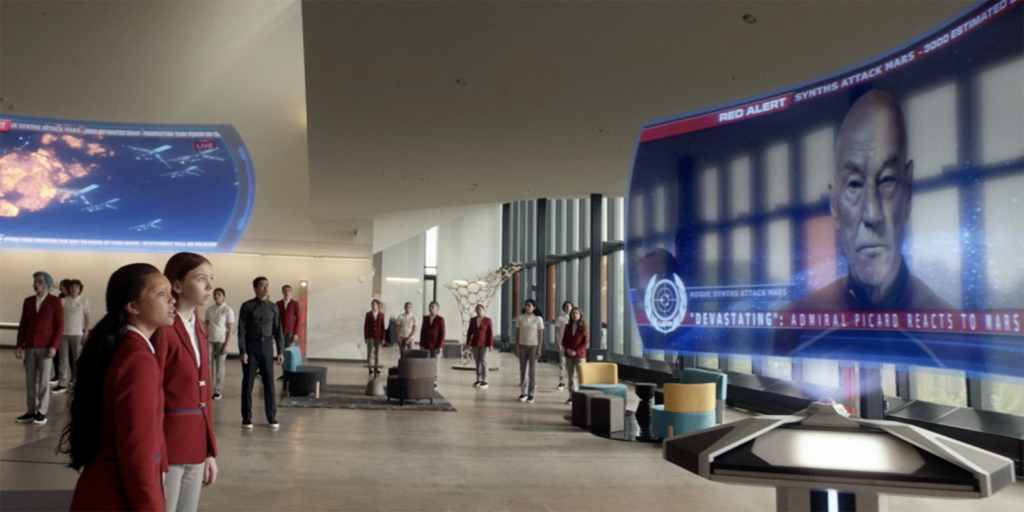
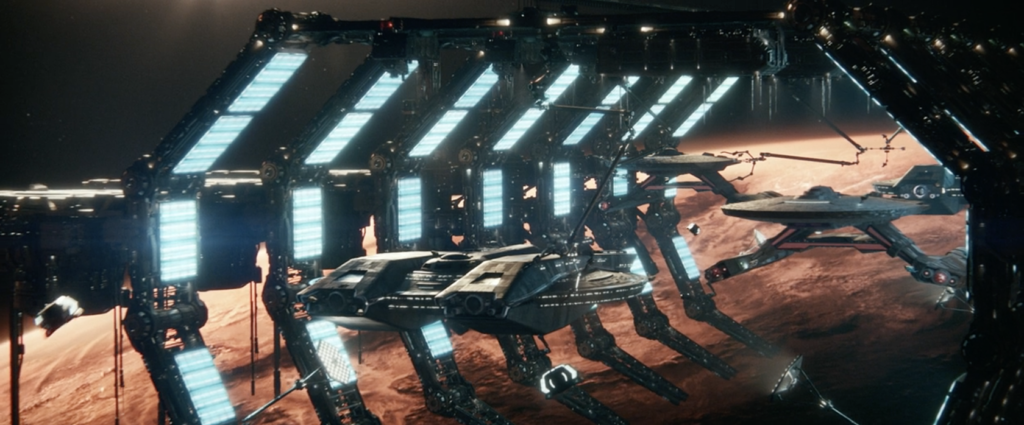
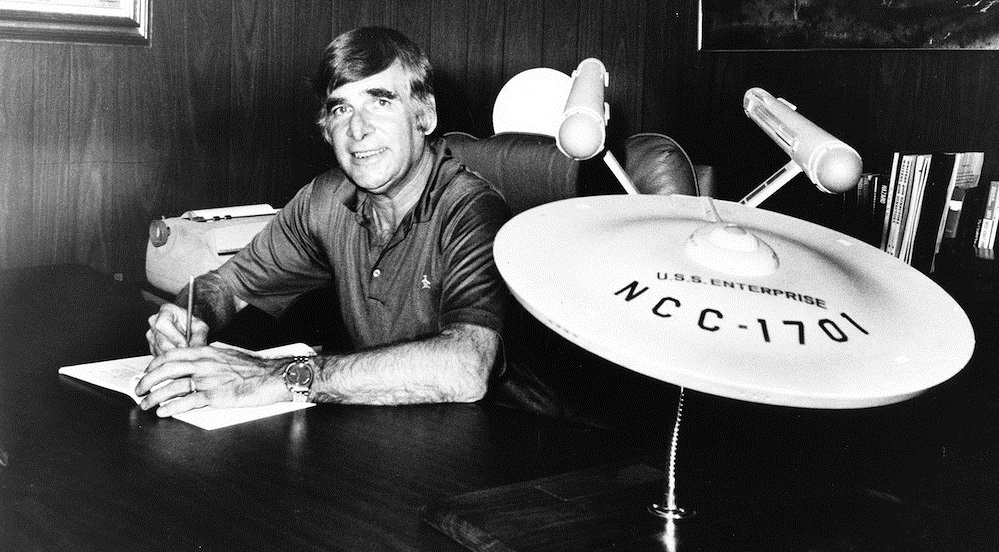
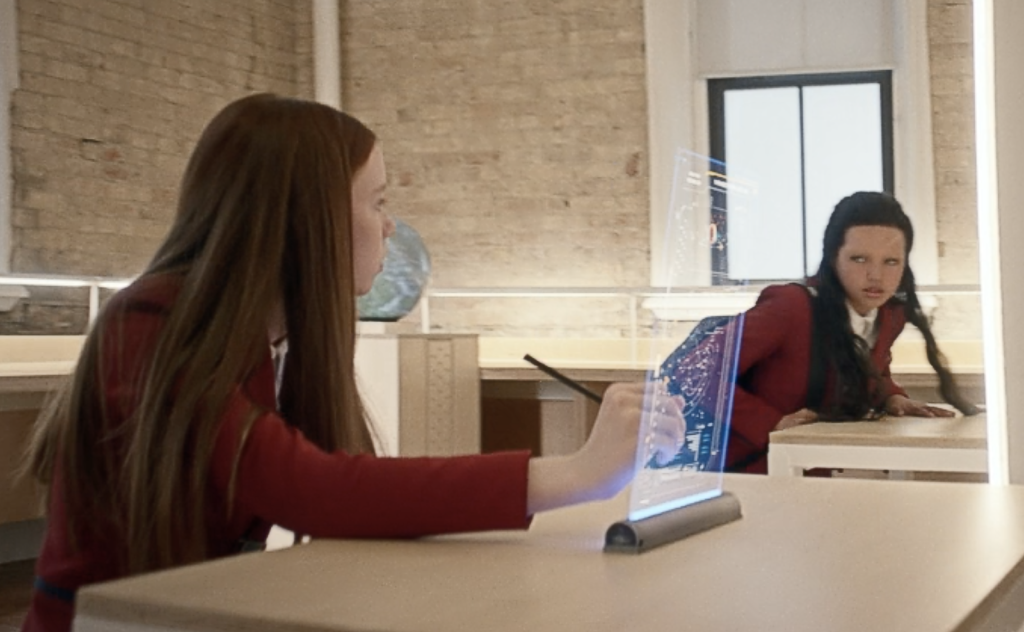
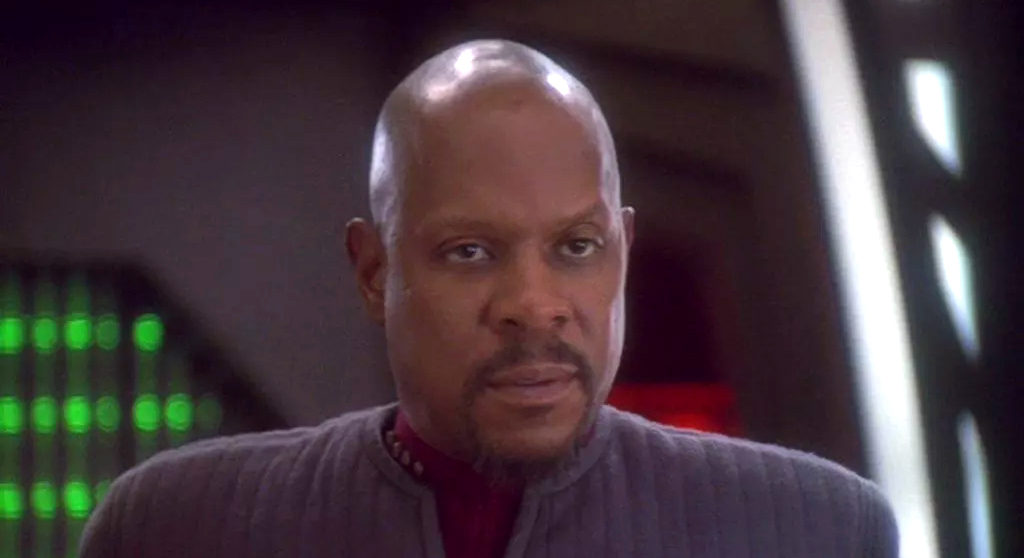
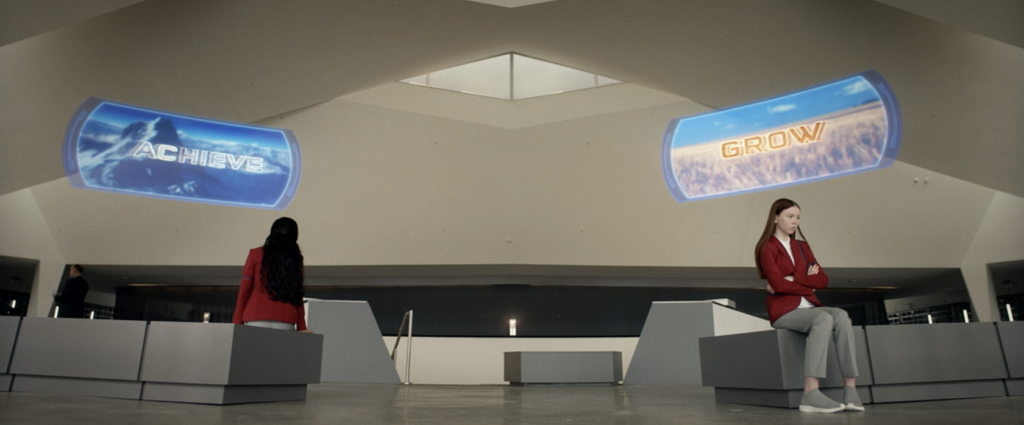
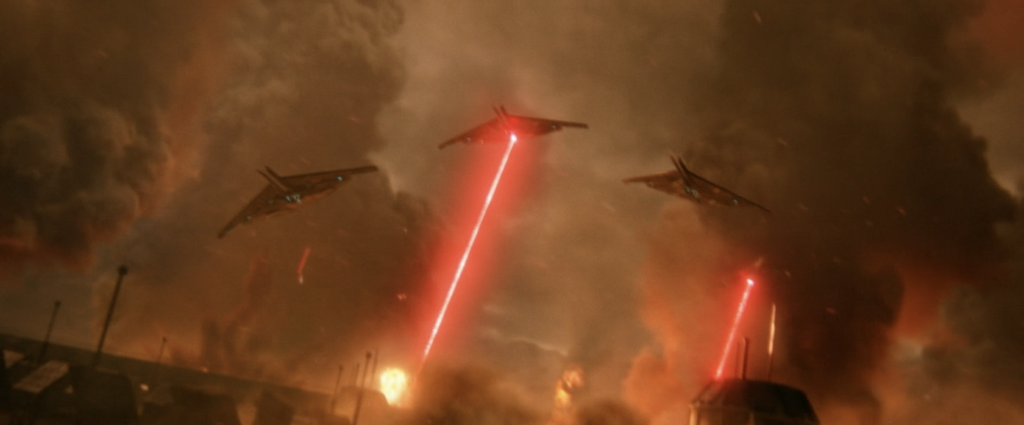
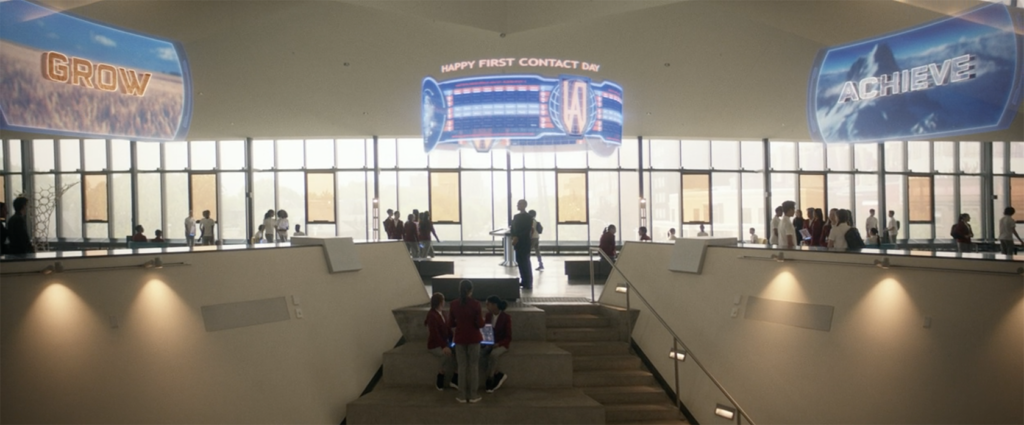
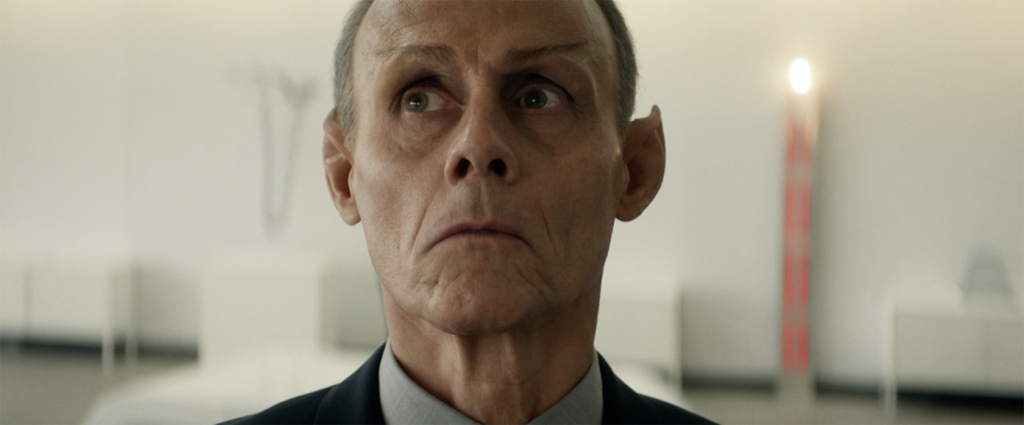
Jonathan…
Let me add a thought, not disputing what you say, but throwing in a few more things.
Forgetting what Gene would or wouldn’t like, as only he would really know that, I think the biggest change in Star Trek of late, and why people (including myself) have gravitated to the Orville has to do more with the serialized nature of television today and the requirements for serialized stories. Let me explain…
The Orville is episodic (yet does carry over threads). Each week the Starship Orville has an adventure. Sometimes it can be a war story, sometimes it can just be good science fiction, and other times it can be a character exploration. Episodic formats allow for this.
In the case of Star Trek, in order to carry a series through one continuing story for 13 or more episodes, you must create a compelling arc – and really what is the only arc that can be created? War! It would be boring to have a 13 episode arc with the continuing fascination of “Data’s Day!” The two best Star Trek episodes (IMHO) ever are The City of the Edge of Forever and The Inner Light. Neither of those focuses on war, but both of them, or anything like them would ever support a season-long arc. A season-long arc really has to focus on war in a sci-fi setting.
Now in saying that, I personally hate that every single element of Star Trek is now a war-drawn story. I really would like a return to episodic adventures going “where no one has gone before.” Some can be war-driven, while others should be good sci-fi and character analyzations.
Maybe in the new world of so many new Star Trek shows there could be room for both. I sincerely hope they can use Pike/Spock/No 1 as a platform to move Star Trek back to episodic adventures and then keep the others so both can be enjoyed.
Finally, I have read just about every interview I can think of with Gene Roddenberry going back to the early 70s. First and foremost it seems that Gene was interested in bringing successful television to the market that a had moral compass. If he were in charge, and the only way to be successful (and make money) was to move Trek to a darker format, while keeping it’s grounding, I’d have to bet he would have gone in that direction as well. While TNG was on the air he wasn’t forced to look at things that way given TNG’s success. If TNG needed to go darker in order for success you bet he would have gone that way.
All of those are excellent insights, David. I tip my virtual hat to you.
Thanks Jonathan. Your insights are also thoughtful.
A general comment. For me, Gene’s idealized future was something to, perhaps, relish for a while, but really could not continue forever ─ it denied the realities of human nature. Look to history. Sixteenth-century Britain and it’s impact on the western world (that’s just a random pick of a century), or more specifically the Napoleonic era for example, and the problems of today are not quite as black when viewed in contrast. Yes, we hope that gradually mankind would learn from its mistakes. That over time, improved communications and better education would lead people to better understand the world, to learn and to grow. But has that really happened?
We can easily point to examples and say we have learned from the past, we have learned, we have grown. Despite a totalitarian regime, the average person in China has a much better standard of living than a century ago, women are getting closer to achieving equality (but, wow, has that taken time and effort, still with some distance to go), homophobia is less of an issue (although nowhere near as improved as it may appear on the surface). But with ongoing advances such as these, in contrast we see the emergence of the present problems of the world, problems and major sources of concern which, to me, cancel out those areas where we have advanced. In balance, has human nature really improved? Or has it just changed in some ways at the expense of others?
So was the utopian perspective of the original Star Trek realistic? Was it something that could continue indefinitely? Look at the world today and the only answer is that Star Trek had to change, to modify the concept of an ideal future, otherwise it’s followers would slowly become disenchanted as we slowly realized it presented an image of the future that just could not be. We may still hold out hopes for the future; we can point to significant advances that have been made; but we must be aware that, fundamentally, human nature is flawed.
My attitude is not as black as that statement may sound, but it’s an acceptance that we are not, and never will be, perfect. Certainly,an ideal future is something to always aim for, but it remains a goal where the goal-posts continually move out of reach.
[That’s off-the-cuff and could have been better said, but the underlying thoughts would remain.]
As Billy Joel (a favorite of Orville Captain Ed Mercer) once said, “The good ol’ days weren’t always good, and tomorrow ain’t as bad as it seems…”
Donald Trump wants to “Make America Great Again”…implying it is/was no longer “great.” But when exactly was it great? In the 1990s under Clinton when the stock market was soaring thanks to Dell and Microsoft and IBM and the tech bubble and any company with a dot-com in the name could rocket an e-Trading taxi driver into the owner of an island? That was great until the bubble burst and the illusions were shattered and fortunes lost.
Was it the 1980s under Reagan when Oliver North was lying under oath about about Iran-Contra in front of Congress and AIDS was spreading as hatred and fear of the homosexual community exploded?
Was it the 1970s, which started with the Vietnam War escalating, followed by Watergate, and ending with the Iran hostage crisis and the OPEC gas crisis and acid rain and disco?
Was it the 1960s when blacks were marching for civil rights…or the 1950s when they essentially had none and Communist spies were hiding under every bed?
Was it the 1940s when we won World War II but turned away boats filled with Jews in order to send them back to almost certain death in Europe or when we locked up 120,000 innocent Japanese Americans because of irrational fear and paranoia?
Was it the 1930s and the height of the Great Depression?
I could go on and on, but the fact is that America was always great in some ways and not great in others…even today. And the same is true of Star Trek. When TOS was airing, Americans were also watching the fictional town of Mayberry where everyone got along with everyone else and knew everyone’s name and the problems weren’t sewage treatment, toxic waste, big corporations closing down mines or factories, opiate addiction, or guns in schools and churches. Blacks weren’t marching through Mayberry, and no one was lynched. The jail cell doors were unlocked, and only Otis ever used them anyway.
We wanted to believe in Mayberry, and we wanted to believe in Star Trek, too. The future could be bright. But would a television audience of today accept Mayberry or the Brady Bunch or even Cheers? Or have we, as a culture and society, moved on a little, grown up a little, and yes, gotten more cynical? As I said, even Orville can get pretty dark. Just look at episodes about Bortus’ people’s prejudices and societal pressures. Just look at Isaac’s people’s terrifying threat to the galaxy. You want a Synth war? Orville already has one!
So maybe our love of the way Star Trek used to be is like our love of Mayberry and the Brady Bunch and Cheers. We’ll always have those great shows, but in today’s world, would they be taken seriously? Would classic Star Trek? Something to ponder…
Completely agree.
Thank you Jonathan, particularly for all the thought that has gone into this. The final par brings it all perfectly1 into focus.
It’s always a challenge writing something about each Short Treks that’s unique. But folks seem to have liked this particular op-ed. Thanks, Bryan.
I didn’t have a problem with the themes of bullying. If anyone thinks there still won’t be kids messing with each other in the 24th century, even in Gene’s “utopian future”, they’re deluding themselves. Plus, all of these characters are civilians, who don’t necessarily have the military discipline that our Starfleet characters do.
My biggest problem with C.O.M. was the format of the episode, which essentially makes it a music video instead of an actual narrative short film. By now, I’d think that the studio would have learned that putting contemporary music into Star Trek ultimately wrecks it in the long haul and dates the show (“The Way to Eden”, the ENT theme song, “Sabotage”, etc.). Unless Alex Kurtzman owes the Bowie estate some money, they didn’t NEED to use this song any more than they needed to use the Beastie Boys (twice!) in the JJ films. In hindsight, though, the music video format shouldn’t surprise anyone considering the video was directed by a music video director from the 90’s.
The biggest problem I have with the ships is, that there really is not a reason to keep using the same ships from Discovery. They have the money to make or tweak models from the feature film era and frankly, if there’d been TNG/DS9 era ships in the dock, you’d have heard little complaining even though the story takes place 25 years later. The producers continue to make stupid design choices and we’re all probably going to have to get right with that or give up on Star Trek altogether because I don’t see them fixing their mistakes anytime soon.
All in all, I think C.O.M. was kind of a step backwards for the ‘Short Treks’ series. If we end up not seeing either of these characters again, I’d deem it a complete failure because the only reason really to do this story was to introduce these characters and use them again in a relevant way in “Picard”.
To be continued…
I’ve spoken with some people about the starships. The feeling from a couple of people in the industry is that the issue wasn’t one of the cost of model creation but of timing. Getting 3D ship designs approved, budgeted, and then modeled would have taken longer than the producers had to work with. The production schedules for Short Treks are waaaaaaaaay shorter than for a full season of Discovery or Picard. Just getting designs approved can take weeks or months. And remember that, once the designs are approved and modeled, it still takes time to do previs for those shots and then render the finals in high resolution.
So rather than spend the time and money for the design of 24th century Starfleet vessels, they just used what was available, which is why the science vessel from “The Trouble with Edward” was seen multiple times.
While I like your review, I must comment about the inclusion of Orville. Orville turned me off immediately with it’s Political Correctness (PC) BS. I believe I watched 3 episodes, and it feels nothing like Star Trek to me. So ya Star Trek had always used under tones of the currents’ time social issues, but even with Discovery have felt like Star Trek, I have enjoyed all Star Treks even the current Short Treks, but Orville is in my opinion not part of the franchise.
Orville isn’t a part of the Star Trek franchise, but it does have the flavor of what TNG might have turned into just as E.L.O. follows The Beatles and Pearl Jam follows Led Zeppelin. Not the same, of course, but a natural evolution/progression.
And I suspect you may have given up on The Orville too soon, Edward. Of course, if you don’t watch it, you won’t understand. But that’s fine. Other fans do.
I thought it was a great introduction into the Picard series, look at the trailers after watching Children of Mars, I edited Children of Mars and all the Picard trailers together to have 25 minutes to watch, so cool, others do have there own opinion, I must stand positive, looks optimistic for Picard LOL
Good article.
But there are some issues i want to point out.
I have seen the Star Trek Franchise always as a utopian Fantasy not as dystopian.
Since 1966 Star Trek was always the shining light Who have always reflected my own values.
And now this is all going downhill because of dramatic reasons?
The moral compass was always the core element of trek.
To strip Down this element from the series, to make the federation a evil entity that abandon all this values, sorry that’s disheartening.
The new trailer from Discovery is foreshadowing hat the federation go Down in flames.
And the choice to represent Burnham as the chosen one to ressurect the UFP is questionable.
After all the buzzing that i read from multiple Site, especially a Interview with Patrick Stewart himself, i am very disapointed about the direction of Trek as a whole.
I am missing good old trek.
I am always open to a modern twist.
But a Franchise should always true to his self.
By the way happy NEW war Jonathan.
Seeing forward to youre take on the Axanar Story.
Good luck with interlude
The question is: has “good old Trek” run its course? It’s a hard philosophical question.
Let’s look at another show that filmed on the Paramount lot at the same time as TOS. I refer, of course, to The Brady Bunch. At the time, the simple themes and always-solvable problems were perfectly reasonable and acceptable on television. Mom and Dad always knew best. The kids all got along perfectly with each other except for those rare episodes when the girls were competing with the boys, Jan was jealous of Marsha-Marsha-Marsha, Peter and Bobby drew a line across their bedroom, Cindy was being a stuck-up brat, or Greg and Marsha were both competing for the attic to be their private bedroom. But those “issues” were always resolved in 22 minutes or less.
When it came time to do The Brady Bunch Movie in 1995, it was so obvious that the world had moved on from such over-simplified silliness that the “gag” of the movie was that the Brady family hadn’t. By keeping them “stuck” in the early 1970s, they became a parody of themselves and certainly good for a few good-natured laughs. But I don’t want that for Star Trek.
While it was great watching Kirk talk evil computers into destroying themselves or Picard negotiate his way out of intra-galactic war, while I loved seeing those crews explore strange, new worlds and seek out new life and new civilizations, isn’t it just more of the same old thing? Aren’t we just seeing Bobby break Mom’s favorite vase when he plays ball in the house…only this time it’s Alice’s pineapple upside-down cake?
I’m still torn on this question, and I’m curious to see if the 10 episodes of Picard confirm my theory that it might be time to change for Star Trek…or if they cement fans’ belief that Star Trek should stick to what got us all here in the first place. We’ll find out soon!
Good points. But I’d prefer something in the middle, like DS9. Not too utopian, but still utopian enough to be something to strive for! And I don’t mind an evil admiral or two, but the whole UFP? That’s not Star Trek anymore. And even in these trying times full of idiots we need a beacon of light (my opinion).
I think your last sentence is the message of the show, Olaf. 🙂
Hi there again. And it should read Happy new year.
Sorry for the typo.
Stupid auto correct.
You make good points, as always and i enjoy youre input to the matter.
Afterall it comes Down to good writing.
But after this trainwreck called Discovery my hopes are very low they can tell a good Story for Picard. This worries me the most.
If the Story is good, than i have no problems, about out of time Spaceships Modells etc.etc.
But all what i see so far is depressing, dark tones.
I have a bad feeling about this.
I hope for the best, expecting the worst.
Greetings from Germany
“Happy New War” seemed like a really funny Freudian slip, Mike. Of course, Freud was Austrian, but he spoke German! 🙂
As I generally do with Trek, I enjoyed this story. As I generally don’t, I stumbled over incidental details of what I took to be VFX stinkers at the conclusion of the tale. The plot of 2 young people having a bad futuristic day that was interrupted by a disaster of history is compelling drama IMHO. Tossing in antique ships in antique docks serviced by antique gear left me scratching my head in a tale that obviously whets our appetite for the upcoming Picard show.
If the larger story involves a new enemy nuking a hemisphere of Mars a la Caprica Is Burning, then a simple long distance sat image of Mars enveloped in explosions on the monitors could have conveyed how the event horrified the girls and how they buried their feud.
If the VFX was meant to get Trekkies typing about it throughout the FB-verse, then the ploy worked.
I think the VFX was meant to help convey the visceral reality of the moment. Seeing things from too far away lacks impact, I think. Imagine the opening of “Saving Private Ryan” seeing only Omaha Beach from 300 feet up looking down. That’s good for an establishing shot, but it won’t make you feel as strongly for all of those men taking bullets and risking their lives for freedom.
Great review, as always, Jonathan. And while I don’t mind the darker tone of it or the bullying (hey, they’re kids, after all), I must second the hard feelings people have about the ships. It’s not that they used ships “similar” to the Discovery ones, they used the exact same ones and didn’t even try to change the color, add some stripes, change the nacelles or anything. Watch the Trekyards video on it, it’s really shocking. It’s 2 exact Discovery ship models, the Discovery shuttle, workbees and the dry dock (though I could personally live with the latter). And the planet in that shot doesn’t even match the look of mars of later in the episode, when its bombarded.
And yeah, all that could be down to time and money constraints (it’s a Short Trek after all), but they also used the Discovery shuttle in the Picard trailer, and unless that’s placeholder VFX, it shows that the powers that be either don’t unterstand or just don’t care. Both I find insulting and very stupid of them to do. As someone said, if they’d just put let’s say a Galaxy class in the drydock (they have the model, as evidenced by the Picard trailer), no one would’ve cared, and I would’ve enjoyed the short! It’s just a stupid decision, and a lot of people must have approved it. And that hurts.
In baseball, we call that an “unforced error.” 🙂
When the attacks on Mars began – it gave me chills.
When I saw Picard’s face on the monitor near the end – it put those chills into overdrive.
You’re exactly right Jonathan. Sci Fi is usually more interpretive than predictive. It’s not trying to say “here’s what the future will be like”. Instead it says “let’s take a look at what inspires, motivates, challenges, and terrifies us today – and tell that story in a safe fictional world where we can explore together safely and ideally with open minds.”
So 60s, 70s, 80s, or today – Star Trek deserves the right to change as long as it keeps challenging us to look at ourselves and our world through this powerful lens of story telling.
Like just about all life-long fans, Discovery has been painful to watch. Not because Star Trek is evolving – but because it just didn’t fit or make sense and flat-out contradicted the story we’ve all enjoyed.
Picard can be dark – that’s ok. It can make changes to visual style and story telling – that’s ok too. My only hope is that the writers and show runners try to make it all in the same world. I’m cautiously optimistic.
Cautiously optimistic on this end, too, Ray!
Hey Jonathan – hope you’re well
An enjoyable read as always – very thought provoking, and I must say a great collection of replies.
There’s little that I can add, other than it seems that little has changed in the cultural zeitgeist between the 1960s (and all the fury over Nixon and the Vietnam war) and today (with all the fury over climate change, Trump and Brexit). There were – and still are – a lot of angry/unhappy people. But there was – and still is – a lot of good in the world too.
It’s self-evident that Gene Roddenberry originally envisioned a future that rose above all of that cultural disharmony to give us reason to be optimistic, and I personally think it’s a shame to have abandoned that optimism for the new Picard series. Only history will judge whether Trump (or indeed any other president) is better or worse than Nixon, but optimism is as important now as it was then, and so to suggest that the future will be as bleak as it is now is rather cold comfort methinks, and also unravels the very threads that make up the Star Trek uniform. But hey-ho, it’s TV, and as one of your other commenters mentioned, it makes things more interesting. And the future-perfect visions of TNG, Voyager and indeed The Orville were beginning to look a little smug. Having said that, I think so much damage has been done to the franchise after Discovery and the JJ movies that these matters are almost moot points.
One final observation: having just watched the first episode of Picard, I wonder why any mention of the Federation was conspicuously absent. Picard’s beef seemed to be with Star Fleet, not with the Federation, and these things can be important not only for story development, but also if the producers are drawing analogies with current events.
All the best,
BB
I think the distinction was on purpose…so far. Picard was a part of Stafrfleet, and he left. He did not leave the Federation. But his disillusionment can be with both. It’s simply “cleaner” for the writers to just give him one word “Stafleet” to say rather than having to add in “…and the United Federation of Planets.” 🙂